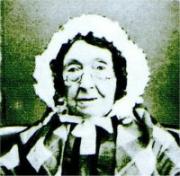|
|
||||||||||||||||||||||||
 |
Featured person
Recently added |
Barry Cowan (1948 - 2004): |
||||||||||||||||||||||
Barry Cowan was one of the best known faces and voices in Ulster broadcasting, chiefly in the 1970s and 1980s, when news and current affairs programmes proliferated. What was required in a presenter and particularly an interviewer was a fine intellect, patience but incisiveness, quick thinking and even-handedness. Cowan had all of these and more.
Cowan was born in Coleraine, County Londonderry, and educated at Ballymena Academy and Queen's University, Belfast, where he graduated in physics. After a short spell acting at the Lyric Theatre, Belfast, he joined the BBC as a studio manager, beginning at Bush House, the BBC's World Service headquarters, before moving back to Belfast. The Troubles in Northern Ireland were at a peak in the early 1970s and in 1974 Cowan became presenter of the principal evening news programme of BBC Northern Ireland, Scene Around Six. This had begun life as a regional magazine programme in a still-peaceful province, but by the time Cowan joined it was covering one of the world's major running news stories. His rôle was not simply reading the news, though he was good at that; often, what was news was occurring when the programme was on air, and the programme's running order altered accordingly. This was frequently the case for BBC Northern Ireland; in fact, many suspected that bombs were exploded or threatened, or other incidents perpetrated, just for this reason, for maximum publicity. His distinguished predecessor, Larry McCoubrey, was occasionally phoned while on air and on camera with breaking news.
There were though more everyday reasons for such edge-of-seat occurrences: in 1978 Cowan to interview on Scene Around Six, an interlocutor in a Dublin studio. With only minutes to run before the programme would be on air, there was an electrical fault in Belfast which disabled most of the crucial facilities: microphones, sound system, autocue and the slide scanner. Cowan nevertheless demonstrated his level-headedness in conducting his interview without being able to see the other party or hear what he said. A government minister present watched everything unfold and later wrote to Cowan in admiration of his professionalism.
But also there would be debates on air, frequently heated or worse, and Cowan had to be something of a boxing referee in the studio. One example of this was the programme Witness Box. This involved debates in-studio on divers themes, some related directly to the Northern Ireland situation such as the Irish border or "Direct Rule" (the powers of the suspended Northern Ireland Parliament being executed by Westminster); it covered also moral questions (abortion); philosophical questions (does God exist?); or the European Economic Community. Chairing such discussions for this programme required someone like Cowan, whom the historian of BBC Northern Ireland described in this context as "a heavyweight in any discussion programme".
When in 1986 producer Martin Dillon launched Talkback, a radio phone-in programme in which viewers called in on all sorts of topics and with widely varying degrees of decorum, constructiveness, intelligence and belligerence, it was Cowan who was chosen to present it. The BBC set up eight dedicated phone lines which were permanently busy, the programme receiving up to 120 calls per hour. Although the programme became, later, associated with Cowan's colleague David Dunseith, it was bequeathed to him by Cowan as already a conspicuous success.
Cowan also appeared in a BBC Northern Ireland comedy programme centred on the popular local actor James Young, acting a journalist assigned to asking people in the street at random on a set theme (in this case the question of "labour" - variously interpreted), all of whom were depicted by Young. He took part in some programmes for children, and was often to be heard on Evening Extra Arts Desk. He also had his own film production company, based in North (County) Down, whose output covered a variety of subjects. In September 1996 Cowan won a Sony Gold Award for an interview with the RUC Chief Constable.
His colleagues and collaborators described Cowan always in the highest terms: a former head of news and current affairs at BBC Northern Ireland said of him: "The BBC's journalism could not have been in better hands. He lived for live broadcasting, both on radio and television - that arena of the unpredictable," adding that he was "a master craftsman, a convivial colleague and a consummate professional."
| Born: | 1 February 1948 |
| Died: | 16 June 2004 |
| Richard Froggatt |
| Acknowledgements: Wesley McCann |
| Bibliography: Jonathan Bardon: Beyond The Studio: A History of BBC Northern Ireland (Belfast, 2000); obituary, The Guardian, 22.6.2004; www.pressgazette.co.uk/story.asp?storyCode=28806; www.bbc.co.uk/northernireland/archive/chronicle/1960s/essay2.shtml |


Home | Our Policies | Plaques | Browse | Search | Sponsors | Links | Help | Contact
Privacy & Disclaimer | Cookie Policy | Site Map | Website Design By K-Point
© 2024 Ulster History Circle









